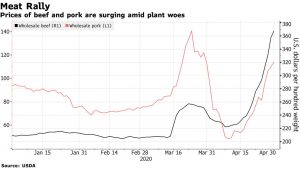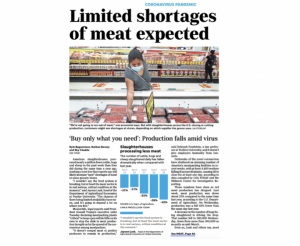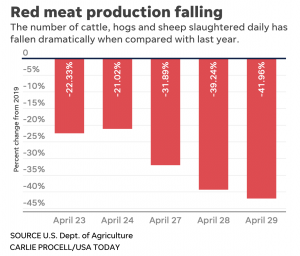Bloomberg's Leah Nylen reported Thursday that "a Colorado judge issued an order temporarily blocking the proposed $25 billion merger of Kroger Co. and Albertsons Cos., which has been challenged by…
Meatpacking Plants Expected to Open in “Days Not Weeks,” as Protein Markets Adjust to COVID-19
Bloomberg’s Mike Dorning reported on Thursday that, “Agriculture Secretary Sonny Perdue said he expects meatpacking plants to reopen in ‘days not weeks‘ under President Donald Trump’s executive order invoking the Defense Production Act.
Slaughterhouse workers should begin receiving more protective gear and access to coronavirus testing ‘virtually immediately,’ Perdue said Thursday in a telephone interview. The U.S. Department of Agriculture has ‘already begun’ working on orders to get them filled on a priority basis by vendors similar to health care workers, he said.
The Bloomberg article noted that, “Perdue said he expect the national shortfall in meat production, which he estimates is currently 20% to 30%, to be narrowed to ‘10% to 15% within a week to 10 days.’
“In many cases, even as plants reopen, they won’t be operating at the same capacity because of safety measures to control the spread of virus, Perdue said.”
.@SecretarySonny on #meat workers health concern amid #coronavirus #pandemic | https://t.co/NlS7gcWM9U
— Farm Policy (@FarmPolicy) April 30, 2020
Jacob Bunge, Jesse Newman and Kirk Maltais reported on Thursday at The Wall Street Journal Online that, “President Trump’s executive order allowing meatpacking plants to continue operating through the coronavirus pandemic is stirring concerns among local officials, wary of new spikes in infection rates if closed plants rush to reopen.
“Since the beginning of the month, meat giants including Tyson Foods Inc., Smithfield Foods Inc., JBS USA Holdings Inc. and Cargill Inc. have closed more than a dozen major U.S. pork, beef and chicken processing plants. Those closures have plunged the food system into disarray, forcing supermarket chains to brace for meat shortages, and backing up slaughter-ready livestock on farms.”
“USDA Secretary Sonny Perdue said in an interview that the president’s order safeguards America’s food system, and that federal health and work safety guidelines will ensure that meatpackers reopen plants with minimal risk of new outbreaks,” the Journal article said.
“Companies are going to need to pay attention to worker welfare. At the same time, we know this is a critical part of our infrastructure, part of our food supply that we need to keep available in a way that’s safe,” says @SecGeneScalia on keeping meatpacking plants open. pic.twitter.com/i0qAc1OUB8
— Squawk Box (@SquawkCNBC) April 30, 2020
And Aime Williams and Gregory Meyer reported today at The Financial Times Online that, “The federal agency assigned to carry out President Donald Trump’s order to keep US slaughterhouses open has a record of saying the safety of meat workers was not its job, raising concerns among union officials about its suitability for its new role.
“The US Department of Agriculture, which inspects meat cuts in beef, poultry and pork plants, was this week put in charge of the effort to restore these plants to full capacity after more than a dozen closed as the coronavirus sickened employees.”
The FT article indicated that, “The FSIS [Food Safety and Inspection Service] has previously disavowed a role in ensuring worker safety. In a rule that ended federal limits on the speed of pork processing lines last year, it said the agency ‘does not have the authority to regulate issues related to establishment worker safety.'”
Today’s article added that, “[Sec. of Ag. Sonny Perdue] acknowledged the department ‘absolutely [did] not’ have authority over workplace safety. ‘We are continuing our focus on food safety, but the food safety is dependent on worker safety,’ he said.
“‘There will be audits and then check-ups, led primarily by our food safety inspection workers who are there in the plants on an ongoing basis,’ he said.”
The North American situation around meat supply “is concerning,” McDonald’s CEO Chris Kempczinski says. “We are monitoring it literally hour-by-hour.” https://t.co/MyhToz9iqz pic.twitter.com/4BJHdqjHEY
— CNBC (@CNBC) April 30, 2020
Meanwhile, Reuters writer Tom Polansek reported yesterday that, “COVID-19 cases at a JBS meatpacking plant in Colorado have more than doubled ‘in a number of days’ and a sixth employee died of the virus, a union official said on Thursday, underscoring the risks of U.S. meat plants reopening.
“The beef plant in Greeley, Colorado, started operating last Friday after it was closed for about two weeks following an outbreak among workers.”
The article added that, “Some 20 plants in North America have closed in recent weeks. U.S. Agriculture Secretary Sonny Perdue said they would open in ‘days not weeks,’ in an interview on Fox News on Thursday. He said the department, which is overseeing Trump’s order, is working to ensure workers’ safety.”
With respect to ongoing impacts of the pandemic on protein markets, Bloomberg writers Jen Skerritt, Michael Hirtzer, and Lydia Mulvany reported yesterday that, “U.S. shoppers are paying 13% more for T-bone steaks than last year, at $7.47 a pound. Ground chuck is up 28%. Prices for pork-sausage breakfast links and patties climbed 13%.
“This is the new reality for American meat eaters in the coronavirus pandemic.”

The Bloomberg article stated that, “It only took a month to break the U.S. meat supply chain. Shutdowns at major slaughter plants started in early April. Even though it was just about a dozen closures, producers have such a stranglehold on output that it leaves few remedies when even a handful of facilities are down. Grocery-store shelves have run empty, and farmers were forced to destroy tens of thousands of animals.”
Also yesterday, Bloomberg writers Lydia Mulvany and Jen Skerritt reported that, “Covid-19 is ripping through America’s heartland and causing shutdowns and slowdowns of plants that process much of the nation’s pork and beef. Prices are already surging.
“Chicken’s a different story. It’s still fairly cheap.”
“While there have been cuts to production at poultry plants, which are mainly located in the southern U.S., and reports of sick workers, the industry hasn’t seen major closures.”
While cracks have appeared in the nation’s pork and beef supply chain as virus outbreaks idle or reduce output in slaughterhouses across the country, poultry processors haven’t been hit by the same severity.
Beyond COVID-19 issues associated with protein, Cleve R. Wootson Jr. reported on the front page of today’s Washington Post that, “Hank Scott believes the bright green rows of ripening cucumbers are the best yield on his land since his father started the farm in 1963.
“So instead, Scott, 64, invited volunteer pickers with the Society of St. Andrew, a Christian hunger relief organization, to glean as much produce as they could and donate it to nearby food banks. Anything green they left behind will likely be plowed back into the ground, feeding no one and adding to the farm’s ballooning losses.
The Post article noted that, “Scott and the volunteer cucumber pickers were trying to bring some sense to what has emerged as one of the most perverse outcomes of the pandemic: farmers forced to destroy fields full of crops while a growing number of families can’t afford enough food.
“On one end are produce growers who supply restaurants, canning companies and theme parks that have been closed for weeks. Meanwhile, increasing unemployment and a convulsing economy have sent many families to the foodlines. In the most agonizing instances, hungry mouths are just a few miles from rotting crops, separated by economic turmoil and ruptured supply chains.”







